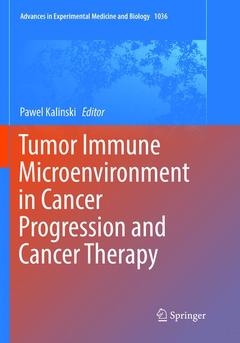Tumor Immune Microenvironment in Cancer Progression and Cancer Therapy, Softcover reprint of the original 1st ed. 2017 Advances in Experimental Medicine and Biology Series, Vol. 1036
Coordonnateur : Kalinski Pawel

Pawel Kalinski, M.D., Ph.D., is the Vice Chair for Translational Research and Professor of Oncology in the Department of Medicine at Roswell Park Cancer Institute (RPCI) in Buffalo, NY. He is also the Director of Cancer Vaccine and Dendritic Cell Therapies in the Center for Immunotherapy, and a Co-Leader of the Tumor Immunology & Immunotherapy Program of RPCI. Dr. Kalinski is a member of the Society for Immunotherapy of Cancer (SITC), American Association of Immunologists (AAI), American Association for Cancer Research (AACR) and the American Society of Clinical Investigation (ASCI) and an editorial board member of several journals in the area of cancer immunology and immunotherapy. He has been the recipient of multiple grants from the National Cancer Institute in recent years. Dr. Kalinski has published over 130 papers in the areas of immunology and cancer research and has been cited over 5,500 times.
Date de parution : 06-2019
Ouvrage de 264 p.
17.8x25.4 cm
Date de parution : 02-2018
Ouvrage de 264 p.
17.8x25.4 cm
Thèmes de Tumor Immune Microenvironment in Cancer Progression and... :
Mots-clés :
cell death; chemokines; hypoxia; metastasis; microenvironment; tumor stroma



